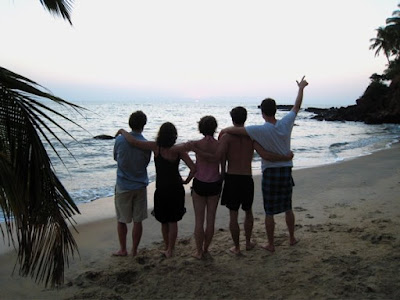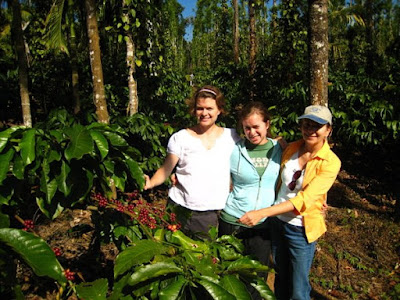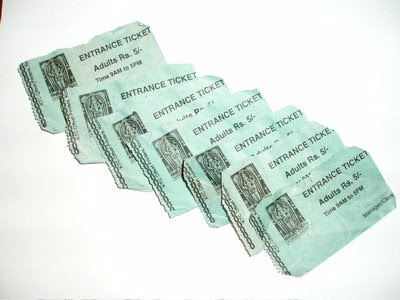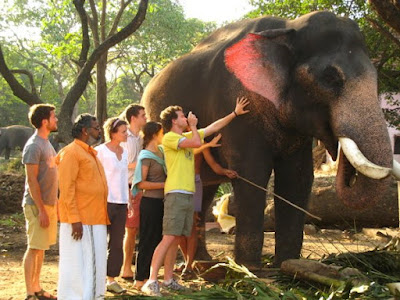Good-bye to paradise, our beach in Kerala, the eastern coast of India near Kannur on the Arabian Sea at sunset.

And hello to a trip into the mountainous tea country of India.
(Yes, David is having a nice, refined cup of chai.)

After a half day in our hired car, we embark on a hike to the top of a mountain, the lower sides of which are planted in tea trees, or are they bushes. It is a huge plantation, we hear, employing 4000 people.
We have a guide who is our equivalent of a park ranger leading the way.

They really are mountains!
 The cloud covered peak to the right is our destination. They don't make the trails with the switchbacks we're used to. They take the more direct route. Puff puff.
The cloud covered peak to the right is our destination. They don't make the trails with the switchbacks we're used to. They take the more direct route. Puff puff.
We have reached a pond, around which we see firm evidence of elephants (large piles of dung and flattened grassy areas). Our guide tells us tigers regularly use this watering hole as well. He wants to turn back since he considers it too late to make the peak. Privately, Elliott doubts this. He says all Indians are terrified of wild animals.


The founder of the feast...
We cave to the pressure of our guide and those of us who don't really want to see a tiger close up (disappointing a few others of us), and head down hill.


In a watch tower part way down. . .






The path ahead surrounded by tea, tea, and more tea.


The founder of the feast...

We cave to the pressure of our guide and those of us who don't really want to see a tiger close up (disappointing a few others of us), and head down hill.



In a watch tower part way down. . .






The path ahead surrounded by tea, tea, and more tea.

Back into the car and on about an hour to our homestay with a prosperous plantation owner and family. Supper was prepared, and as dark intensified, we ate out on the veranda, served by the family.

The next day we had a walking tour of the "farm" which produced a whole host of crops, including coffee (here with the girls), bananas, rubber.

The plantation also had some ancient (or at least really old) ruins
--here a Hindu temple.

The next day we had a walking tour of the "farm" which produced a whole host of crops, including coffee (here with the girls), bananas, rubber.

The plantation also had some ancient (or at least really old) ruins
--here a Hindu temple.


Coffee beans being dried or ripened or whatever in the sun.

Here are the beans on their large concrete drying floor.


Here are the beans on their large concrete drying floor.

These are children of what our hosts called "our aboriginals." They evidently are a more indigenous ethnic group who are content to continue serving as they have for hundreds of years, and to preserve their own simple culture without modernizing by doing such things as sending their children to school.



All of us but Eden stayed in the "tiki hut" specially built for guests--very pretty and well appointed with windows open to the outside . Eden stayed in a bedroom in the main house, and was disconcerted by a large wolf spider on the wall near her bed--very common sight inside houses there. The hostess kindly removed it for her, but two more showed up next morning in her bathroom. Well, they do keep the bugs down.
 The tiki house porch and stairs. The watch dogs were kept underneath it. Too bad they wake up and growl and bark so early in the morning!
The tiki house porch and stairs. The watch dogs were kept underneath it. Too bad they wake up and growl and bark so early in the morning! And now we must leave our plantation homestay behind and spend one terrifying day in our hired car with our hired driver (who was with us for 3 days) driving all day to get to Kochi for Steve's and my flight back to Chennai and then homeward. Did you know that India has the worst driving and traffic in the world and the most traffic fatalities in the world. Well, now we are absolutely sure why! Can you think up a caption for this picture? Maybe something like, "After a tense few hours in heavy and chaotic traffic, and with her lice bothering her more than ever, Jessica contemplated violence against her unsuspecting mother while Eden coped by slipping into a meditative state."
And now we must leave our plantation homestay behind and spend one terrifying day in our hired car with our hired driver (who was with us for 3 days) driving all day to get to Kochi for Steve's and my flight back to Chennai and then homeward. Did you know that India has the worst driving and traffic in the world and the most traffic fatalities in the world. Well, now we are absolutely sure why! Can you think up a caption for this picture? Maybe something like, "After a tense few hours in heavy and chaotic traffic, and with her lice bothering her more than ever, Jessica contemplated violence against her unsuspecting mother while Eden coped by slipping into a meditative state."
Fortunately, there were the rest stops where the boys demanded their orange Maaza, the parents got accused by a vendor of stealing tea, and all sought the local squattie pottie (Thanks to Joanna Beard for that very apt term).


 One final stop before the airport was at a famous temple where they keep over 100 elephants used in special Hindu ceremonies throughout the whole area. Each elephant has its own special keeper who takes care of it always (as much as that is possible, I suppose). Many people come to see the elephants and I suppose the revenue from the tourism helps support their care.
One final stop before the airport was at a famous temple where they keep over 100 elephants used in special Hindu ceremonies throughout the whole area. Each elephant has its own special keeper who takes care of it always (as much as that is possible, I suppose). Many people come to see the elephants and I suppose the revenue from the tourism helps support their care. The mottled pink coloring on many of the elephants seemed unusual, but Elliott said it was not unusual for Indian elephants.
The mottled pink coloring on many of the elephants seemed unusual, but Elliott said it was not unusual for Indian elephants.

And so after a hurried run through the grounds occupied by 100 elephants, we jumped into the van and headed for the airport. A tearful good-bye sent Steve and Meg homeward and the five younger Garbers on to greater adventures into the famous back waters of Kerala. You will have to ask them for those pictures and descriptions.